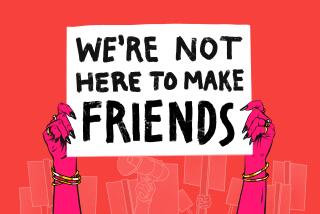‘Toughest Jobs’ is a grind
- Share via
“Deadliest Catch,” “Ice Road Truckers,” “Black Gold,” “Ax Men”: They’re like snuff films in a way. On the dangerous jobs documented on these programs, grave tragedy is always just around the corner, and to watch these shows is, in a sense, to root for death. When nothing bad happens, the cloud of the macabre that gives these shows their tension gets lighter and lighter.
And thankfully, these shows consistently fall short: Nothing catastrophic happens, and so there is no real payoff other than watching big bruisers of men tackle almost comically difficult tasks and complete them, satisfying only enthusiasts of an efficient workplace.
All of the above shows are the brainchild of Thom Beers, who in the last three years has helped legitimize brawn culture on television. Unlike his spiritual peers in mixed martial arts (which has also become a ratings hit for Spike TV and, more recently, CBS), Beers believes in the heroism of the common man, making TV stars of people who work in the shadows and would probably rather be downing a beer at the local bar. It’s proletariat chic.
Consider “America’s Toughest Jobs,” which has its premiere at 9 p.m. Monday on NBC, a Thom Beers tasting menu -- the vacation version of any of his other shows, “The Amazing Race” with the threat of injury.
Here, 13 competitors are worked to the bone in a series of tasks, the first two of which will be familiar to Beers junkies -- crabbing boats in the Bering Sea and long-haul trucking routes in Alaska. Each week, one player will be eliminated until the most versatile masochist remains.
But for all this show’s pomp, it feels flimsy, as if these jobs might not be more taxing than participating in “Survivor” or tougher to manage than a stint on “Fear Factor.”
Even though in crab fishing “the injury rate is nearly 100%” and “more than 80 souls have been lost in the Bering Sea since 1990,” there is shockingly little suspense in this week’s episode.
It doesn’t help that the competitors aren’t fame-hounds or adventure junkies. Rather, they are people motivated by profound inner sadness, seeking to shake the cobwebs from their lives. That this is the motivation is clear from the opening scene, in which host Josh Temple, who appears to have won a Joe Rogan smirk-alike contest, asks the camera, “What if you had a chance to change your life? Would you take it?”
Those who do, though, struggle with their own limitations. There’s Amy, a prim 40-year-old businesswoman who in the first episode confesses that at home she keeps books in her stove. “To me this is the biggest opportunity of my lifetime, ever,” she says, “I will die -- I will not go home.”
Next week, Chris, a beefy 49-year-old investment broker from Queens, N.Y., with a thick accent, explains his drive: “When you hit a certain age, like 49 pushing 50, you wanna achieve certain things in life. I don’t know if it’s a midage crisis or what. You want a challenge. I’m a thoroughbred. You gotta let a thoroughbred run.”
Fair enough, but one of the most notable discoveries from the first two weeks of competition is that there is no direct correlation between physical appearance and comport and skill at the assigned tasks.
And the most sobering part of each episode comes at the end, when the remaining contestants learn how much money has been added to the final prize, which will be the accumulated salaries of all the jobs performed. Each of the first two has been around $30,000, an uncomfortably low number, especially given the intensity of the work.
This, in turn, suggests another sort of show, one potentially more harrowing than any of the brawn extravaganzas. On it, people with taxing jobs who earn disproportionately little money reveal what their lives are like off the job -- their financial struggles, their psychological burdens, and so on. Because the truth is, it’s not necessarily what happens on the clock that makes a job tough.
More to Read
The complete guide to home viewing
Get Screen Gab for everything about the TV shows and streaming movies everyone’s talking about.
You may occasionally receive promotional content from the Los Angeles Times.






